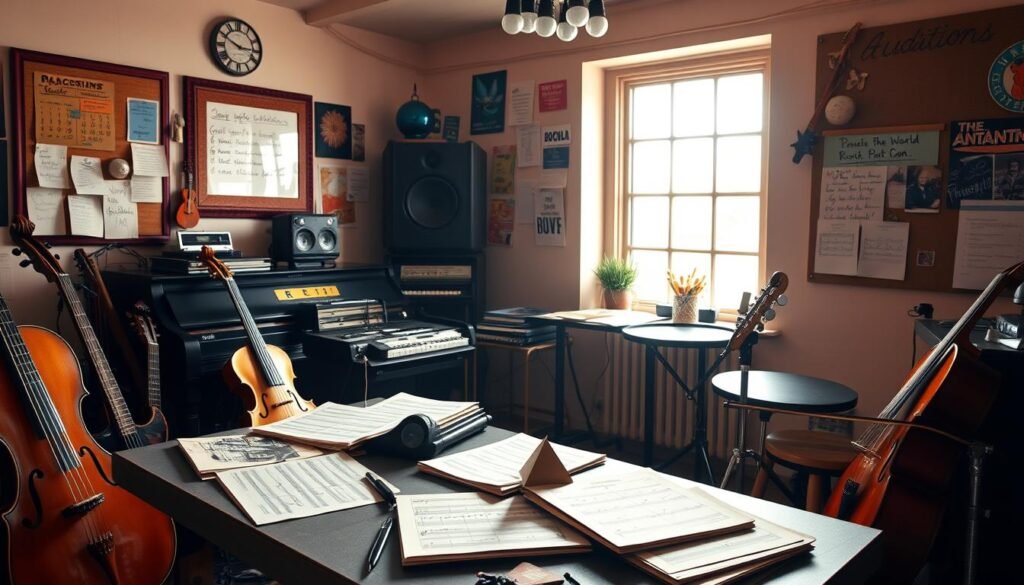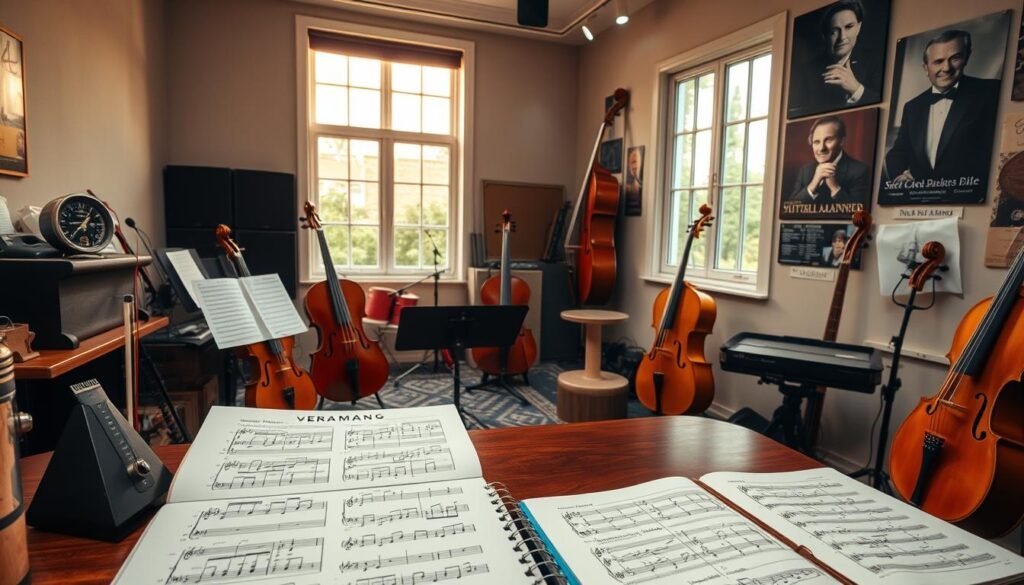Music University Audition Tips are a big step towards a career in the performing arts. To do well, you need to prepare and practice a lot. Dr. Annie Bosler, a horn player and College Prep for Musicians™ consultant, shares ten key tips for success in these auditions.
Also Read: Best Music Career Strategies For Beginners
The audition season is from January 15 to March 15 for high school seniors. Getting into these top schools is tough. But with Dr. Bosler’s advice, you can stand out and achieve your musical dreams.
Key Takeaways
- Learn all about music university auditions, including what to prepare, when to do it, and what music to play.
- Use professional practice and preparation methods, like making a good practice plan, checking your own progress, and doing mock auditions.
- Focus on being ready for the audition day, managing nerves, looking confident, and having a pre-audition routine.
- Work on making your performance unique by improving your interpretation, understanding the music, and being more engaging on stage.
- Stay determined, positive, and always keep learning, even when things don’t go as planned.
Understanding Music University Audition Requirements
Getting ready for a music university audition takes a lot of work and focus. Students planning to major in music need to check each school’s specific needs. The audition materials can change a lot from one place to another.
Also Read: Expert Tips For Writing Song Lyrics And Music
Types of Audition Materials Required
Music university auditions ask for a variety of things. You might need to play a slow piece to show your musical skill. You’ll also play a Bach piece to show you understand different styles. And, you’ll play a fast, challenging piece like a concerto movement.
It’s important to pick pieces that show off your unique talent. They should also fit what the school looks for in an audition.
Timing and Application Deadlines
When and where to audition can change a lot between schools. Some might tell you when and where to go just 3-4 weeks before. It’s key to keep track of each school’s deadlines and audition times.
Selection of Appropriate Repertoire
Choosing the right music for your audition is very important. It should show your range and love for music. It’s best to start planning about a year before your audition. This way, you can prepare a strong and interesting program.
Also Read: Vocal Training For Beginners: Your Complete Guide
“Choosing pieces that represent you in the best light is crucial for a successful music university audition.”
Essential Music University Audition Tips

To ace music university auditions, focus on key musical skills and concepts. This includes playing an instrument well and understanding melody and harmony. You should also know how to read sheet music and recognize musical intervals and chords. Plus, ear training is crucial.
It’s smart to practice different pieces to show your versatility. Students should grasp the history behind their chosen pieces. They should also develop their own unique interpretations to highlight artistry and musicality. This requires deep music theory study and consistent practice.
- Develop proficiency in your primary instrument or voice.
- Cultivate a strong understanding of musical theory and aural skills.
- Prepare a varied repertoire that showcases your technical and interpretive abilities.
- Research the specific audition requirements of each university you’re applying to.
- Practice regularly and record yourself to assess your progress.
- Attend mock auditions or seek feedback from music teachers and mentors.
- Maintain a positive mindset and focus on delivering your best performance.
“The key to a successful music university audition is a combination of technical mastery, musical expression, and a genuine passion for the art form.”
By following these tips and putting in the effort for audition preparation, aspiring music students can boost their chances of getting into their dream university.
Also Read: Best Music Marketing Strategies For Beginners
Professional Practice and Preparation Techniques

Effective practice is key for a successful music university audition. Create a structured practice routine with clear goals for each session. Focus on quality over quantity, using techniques like slow practice and metronome work to improve weak areas.
Creating an Effective Practice Schedule
Give yourself plenty of time for audition prep. Avoid cramming, as it doesn’t help your performance. Start practicing early, ideally several months before the audition. Break your practice into segments like technical work, repertoire review, and mental prep.
Recording and Self-Assessment Methods
Recording your practice can help with self-assessment. Listen to these recordings to spot areas for improvement and track your progress. This helps refine your interpretation and tackle technical or musical challenges.
Also Read: Music Career Goals: A Guide To Long Term Success
Mock Audition Strategies
Mock auditions are a crucial part of prep. Professional musicians may do 40-50 mock auditions before the real thing. Practice playing your pieces in different orders, as audition panels might not follow a set sequence. Increase your practice time to play through complete audition repertoire as the audition nears.
By using these practice techniques, self-assessment methods, and mock audition strategies, you can boost your confidence and performance skills. This will help you excel in your music university audition.
Mastering Performance Day Essentials

As audition day approaches, getting ready and feeling confident is key. Arrive early at the audition venue. This lets you check in, warm up, and get used to the space.
Wear something professional yet comfy, following the music university’s dress code. Do thorough physical and mental warm-ups. This includes breathing exercises and visualization to stay focused and ready to show your audition day preparation, stage presence, and confidence.
- Keep a confident and poised stage presence during the audition. Make eye contact with the judges and start strong to grab their attention.
- Be ready for surprises, like stopping mid-performance or playing out of order. Stay flexible and calm, showing you can think quickly.
- Send a professional thank-you email after the audition. This small act can make a big impression.
By following these tips, you can face audition day with confidence. This will help you stand out and increase your chances of getting into your dream music university.
“Preparation is the key to success. The more time and effort you invest in honing your craft, the more confident and poised you’ll be on audition day.”
Also Read: How To Choose The Right Vocal Music Universities?
Building Musical Artistry and Expression
To stand out in music auditions, focus on your unique artistic voice. Understand the history of your pieces to guide your interpretation. Experiment with dynamics, phrasing, and tempo to make your performance stand out.
Developing Unique Interpretation
Creating a unique interpretation means looking at the musical and cultural influences of your pieces. Study the composer’s intent and the era they wrote in. Use this knowledge to add your personal touch and artistic vision to the music.
Understanding Musical Context
Knowing the musical context of your pieces is key. Research the composer’s life and the time they wrote in. This helps you make choices about how to perform the music, staying true to the composer’s vision.
Enhancing Stage Presence
Music university auditions value both technical skill and stage presence. Practice in front of others to improve your stage presence. Show your true self and let your passion for music shine.
FAQs
Q: What should I prepare for my college audition?
A: For your college audition, it’s essential to have a well-rounded audition repertoire that showcases your technical and musical abilities. Include pieces that demonstrate your strengths and consider the specific requirements of the music program you’re applying to.
Q: How can I choose the right private teacher for my preparation?
A: Look for a private teacher who has experience with college music auditions. They should understand the audition process and be familiar with the expectations of various music schools. A good fit will help you refine your skills and boost your confidence.
Q: What is the importance of a live audition in the application process?
A: A live audition is often a crucial part of the application and audition process for many schools. It allows the auditioning students to demonstrate their performance skills in real-time, giving the faculty a chance to assess not only technical proficiency but also the applicant’s musicality and personality.
Q: How can I manage my nerves during a music audition?
A: Managing nerves is essential for a successful music audition. Practice relaxation techniques, such as deep breathing or visualization, and rehearse your pieces thoroughly. Remember that every applicant experiences some level of anxiety, and it’s a normal part of the musical journey.
Q: Should I focus on one genre for my audition repertoire?
A: While you can specialize in a particular genre, it’s beneficial to include various music styles in your audition repertoire. This approach showcases your versatility and ability to adapt to different musical contexts, which is vital for most college music programs.
Q: What role does the ensemble play in my college music experience?
A: Participating in an ensemble, such as orchestra or marching band, is a significant aspect of music education in college. It helps you develop collaboration skills and gain performance experience, both of which are crucial for a successful music degree program.
Q: How can I stand out among many schools during the audition process?
A: To stand out in the college music auditions, focus on presenting a polished performance that highlights your unique qualities as a musician. Prepare thoroughly, choose pieces that resonate with you, and convey your passion for music during your audition.
Q: What should I consider when choosing schools for my music major?
A: When selecting schools for your music major, consider factors such as the music program’s reputation, faculty expertise, and the availability of resources like practice rooms and performance opportunities. Research each school’s approach to music education to find a good fit for your goals.
Q: How can I prepare for the technical requirements of a music audition?
A: To prepare for the technical requirements, practice regularly with a focus on specific skills needed for your instrument or voice. Work with your private teacher to identify areas for improvement, and consider including etudes or technical exercises in your audition repertoire.
Source Links
- https://majoringinmusic.com/successful-music-audition/
- https://splice.com/blog/music-auditions-guide/
- https://majoringinmusic.com/playing-your-best-college-music-auditions/
- https://insidemusicschools.com/2019/02/05/how-to-prepare-for-your-music-college-auditions/
- https://talk.collegeconfidential.com/t/audition-advice-for-music-students-and-their-parents/2037726
- https://www.ensembleschools.com/blog/preparing-for-college-audition/
- https://www.colburnschool.edu/10-tips-for-acing-your-college-music-auditions/
- https://www.davidfrenchmusic.com/p-4950-how-do-you-practice-for-a-music-audition.aspx?srsltid=AfmBOooymSSHAwv6mWjVwqnTFegQgkhMF5QorzXIOnhypgU19DqafPkw
- https://music.osu.edu/sites/default/files/Audition Tips KBJ 9-22post.pdf
- https://www.stagesmusicarts.com/mastering-the-art-of-the-audition-shannon-czapla/
- https://wsmamusic.org/hs-honors/auditions/tips/
- https://meritmusic.org/tips-acing-conservatory-audition/
- https://playbill.com/article/secrets-to-nailing-your-college-audition-com-357974
- https://airandinkstudio.com/college-audition-guide/




